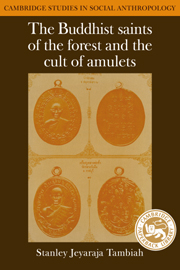Book contents
- Frontmatter
- Contents
- Acknowledgments
- Note on transcription
- 1 Introduction and manifesto
- Part I The arahant and the Path of Meditation
- Part II The hagiography of a Buddhist saint: text and context; the politics of sectarianism
- 6 The biography of a modern saint
- 7 The Buddha's life as paradigm
- 8 The ordering principles behind Buddhist saintly biography
- 9 The disciples of the Master
- 10 The biographer as exemplary forest-monk, meditator, and teacher
- 11 Sectarianism and the sponsorship of meditation
- 12 The Mahānikāi sect's propagation of lay meditation
- 13 The center–periphery dialectic: the Mahāthāt and Bovonniwet sponsorship of meditation compared
- Part III The cult of amulets: the objectification and transmission of charisma
- Part IV Conceptual and theoretical clarifications
- Notes
- Index
- CAMBRIDGE STUDIES IN SOCIAL ANTHROPOLOGY
13 - The center–periphery dialectic: the Mahāthāt and Bovonniwet sponsorship of meditation compared
Published online by Cambridge University Press: 10 December 2009
- Frontmatter
- Contents
- Acknowledgments
- Note on transcription
- 1 Introduction and manifesto
- Part I The arahant and the Path of Meditation
- Part II The hagiography of a Buddhist saint: text and context; the politics of sectarianism
- 6 The biography of a modern saint
- 7 The Buddha's life as paradigm
- 8 The ordering principles behind Buddhist saintly biography
- 9 The disciples of the Master
- 10 The biographer as exemplary forest-monk, meditator, and teacher
- 11 Sectarianism and the sponsorship of meditation
- 12 The Mahānikāi sect's propagation of lay meditation
- 13 The center–periphery dialectic: the Mahāthāt and Bovonniwet sponsorship of meditation compared
- Part III The cult of amulets: the objectification and transmission of charisma
- Part IV Conceptual and theoretical clarifications
- Notes
- Index
- CAMBRIDGE STUDIES IN SOCIAL ANTHROPOLOGY
Summary
The mid-fifties were the climactic years of the countrywide sponsorship of meditation by Wat Mahāthāt. It represented an impulsion generated from the capital, which, as the radial center of the country, attempted to spread a religious renewal to the periphery, to the various provinces that were thought to need a revitalization. We have seen that the monk who was at the center of this missionary drive, Phra Phimolatham, was the abbot of the country's largest wat. He was a titled monk holding a high position in the ecclesiastical hierarchy, and he incarnated the prestige of the established sangha in its self-assured authority and superiority over the wat distributed throughout the country. Phra Phimolatham was up to a point a scholar-monk, but not eminently or exclusively; he was an adept teacher and propagator of meditation without being a great meditation “master” or a dedicated ascetic and recluse on the path to arahantship. He was rather the urbane, eloquent, powerful cleric of the establishment, especially of the Mahānikāi sect – the largest in the country, the sect with which the great body of the nonaristocratic commoner population was affiliated, a sect of varied achievements and worldly attachments.
It is very much in line with this orientation that Phra Phimolatham's meditation drive was (and still is, under the leadership of Phra Thepsiddhimuni) addressed to both monks and the laity alike; in some respects, the latter has been the more important constituency. And it was for this reason that Prime Minister Sarit, aided and abetted by certain Thammayut-sect authorities, could construe it as more than simply “religious, ” as threateningly “political, ” in significance.
- Type
- Chapter
- Information
- The Buddhist Saints of the Forest and the Cult of Amulets , pp. 183 - 192Publisher: Cambridge University PressPrint publication year: 1984



